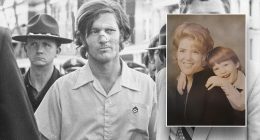
There is nothing inherently funny about the fraud committed by Theranos founder Elizabeth Holmes, but in the hands of creator Elizabeth Meriwether and director Michael Showalter, the retelling of Holmes’ rise and fall elicits more than a few chuckles.
For Showalter, whose comedic background includes co-creating Wet Hot American Summer and Search Party, that dark humor was a vital part of The Dropout. “Part of what’s interesting about this story is that these people exist inside of this strange bubble that none of us really understand, where millions of dollars are being handed back and forth as if it’s no big deal,” says the director. “The stakes are strange because while, as the show continues, real people are being affected by it, there’s also a Bonfire of the Vanities situation.”
The unique tone of the eight-part series was a result of a close collaboration with Meriwether. “Elizabeth has a really specific sense of humor that’s kind of cringey and uncomfortable, a humor in exposing people’s oddness and idiosyncrasy,” says Showalter.
Of course, it is all just words on paper without Amanda Seyfried bringing Holmes to life. “To have had a front-row seat to watching this great performance being created and to feel like I may have had some role in that is an amazing feeling,” says the director, who in 2021 directed Jessica Chastain to an Academy Award for The Eyes of Tammy Faye. “I felt when we were doing this show that we were making something special. The scripts were great and the performances were amazing. It was funny and the tone was coming across. I’m so proud of it and so proud to have been a part of it.”
As a director and executive producer, you get to set the identity of a series. Can you describe what that meant for The Dropout?
It has a really specific and very nuanced tone. I felt that my job was to try to the best of my ability understand what Elizabeth Meriwether’s vision was, and to really execute that. It wasn’t going to be as simple as just shooting the scenes. It was about trying to understand where the emphasis was, in terms of the way we were going to tell the story cinematically and calibrate the performances to create a feeling. I really spent a lot of time with Elizabeth going through the scripts, page by page. “What do you see here? What’s the joke? What’s at the heart of the scene?” And she has endless ideas about it. She was very specific and very clear. So, for me, the challenge, in a good way, was to give that to her. And then passing that on to the directors that came after me, wanting to make sure that the show has a consistent feeling to it throughout.
How much work did you and Amanda do before the shoot to establish Elizabeth Holmes?
From the minute she was cast and throughout shooting, it was a constant evolutionary process of trying to figure out the character. We had met and spent a day together, just talking about the story and the character, and she went away with a lot of material to research. She then sent me a video of her ad-libbing, just talking extemporaneously in character. It was like, “Oh my God, that’s it.” It was shocking, this unbelievable interpretation of the character. But it was this ongoing, collaborative thing. There’s a scene in “Green Juice” that is a good example of it. The argument scene at the end of the episode where Sunny [Naveen Andrews] is violent with her in the kitchen and spills the green juice all over her — the way she’s talking to him, she’s so condescending. There’s this contempt that she has for him, like he’s pathetic. That was something we had to discover. Our first thought wasn’t that it was how that scene played out. It was like, “What’s wrong? Why isn’t this feeling elevated?” When you try the scene a different way, all of a sudden you learn something about the character that you hadn’t figured out before.
Everyone loves a transformation, but what was equally important about showing Holmes pre-rise?
It’s important to remember that there is a human being there, with a story and a life. My episodes, in a way, are about Elizabeth, and the episodes that come after are about the people who took her down. One of the questions that I really am fascinated by is, “How do you go through life with that much baggage? How do you wake up in the morning every day and eat breakfast and talk to people when you’ve got this gigantic lie that you’re carrying around? How do you look people in the eye?” For me, it would be crippling. I wouldn’t be able to function. And I think that in my episodes, there’s a story of how she created a version of herself that could handle that. You see it at the end of “Green Juice” when she puts on the turtleneck. The version of her that we’ve gotten to know a little bit — this overachiever, perfectionist, kind of oddball — couldn’t handle it. But the Elizabeth in the turtleneck could.
The transition is incredible, but probably very delicate in terms of broadness. How did you work on the scenes where Elizabeth lowers her voice or is pumping herself up?
The great thing about Amanda is she is truly someone who will throw herself completely into a scene. But she’s also open to whatever input she’s being given. It’s almost improv. She’s this vessel. She’s like, “Tell me what to do.” Not that she doesn’t have her own ideas, but there is this openness about her. She’s in character, but she also wants to have the director give her direction. And then she’ll embody that. I found her to be very nimble as an actor, in a way that is not typical. It was figuring it out in the moment a lot of the time. More often than not, it was fantastic on the first try, but sometimes something would feel off and we’d keep working on it until we felt like it was working. Where maybe that slows us down a little bit, those are the moments where, as the director, I need to be able to say to the producers, “We need a minute. I don’t care if we’re taking extra time here.”
Was there a scene or sequence in your episodes that you were nervous about?
We did a long sequence where Elizabeth and Sunny meet each other in Beijing, and it was so important to me that it looked real, that the audience not be super distracted by the fact that we shot that in Los Angeles. We were in downtown L.A. and there were a lot of special effects, and all our background extras were local actors. Those are the scenes where I have to be on high alert, just to make sure that you feel like you’re in a grounded reality.
Was there a scene that you felt really opened her up to you as a human?
There’s a scene in episode one that I really love. The father has this humiliating task of having to ask William H. Macy’s character for money. William H. Macy’s character embarrasses him in front of his whole family, and later that night, Elizabeth goes down to his office, to tell him it’s OK. Like, “We don’t need that guy. Who cares. We’re fine.” And he just starts crying uncontrollably in his office. It’s this person she admires so much, and they’re so close. We definitely felt like a lot of Elizabeth’s drive came from him and wanting to live up to his expectations of her. And she puts her hand on his shoulder and he flinches and pulls his shoulder away from her. And she’s just standing in his office, frozen, not knowing quite what to do, not knowing if she should leave, if she should stay, if she should try to be affectionate with him. In that moment, I really felt for her, because you understand there’s just so much complicated insanity that she’s dealing with as a young person.
You’re nominated for your work on “Green Juice.” Was there something that stands out to you about that episode?
It’s the episode where we see her put the turtleneck on, which is that ultimate moment of transformation where she becomes the Elizabeth Holmes that we all know. But I also think as a piece of writing, it’s so brilliant that Elizabeth Meriwether focused in on this idea of green juice and what that could symbolize. For Elizabeth Holmes, green juice becomes a prop. And there is the scene where she is at a crossroads between walking away and counting her losses or quadrupling down. And she quadruples down. Someone was saying, “It’s like The Godfather, where Michael Corleone consolidates all his power.” That’s what that episode is.
This story first appeared in an August stand-alone issue of The Hollywood Reporter magazine.
Source: Hollywood









